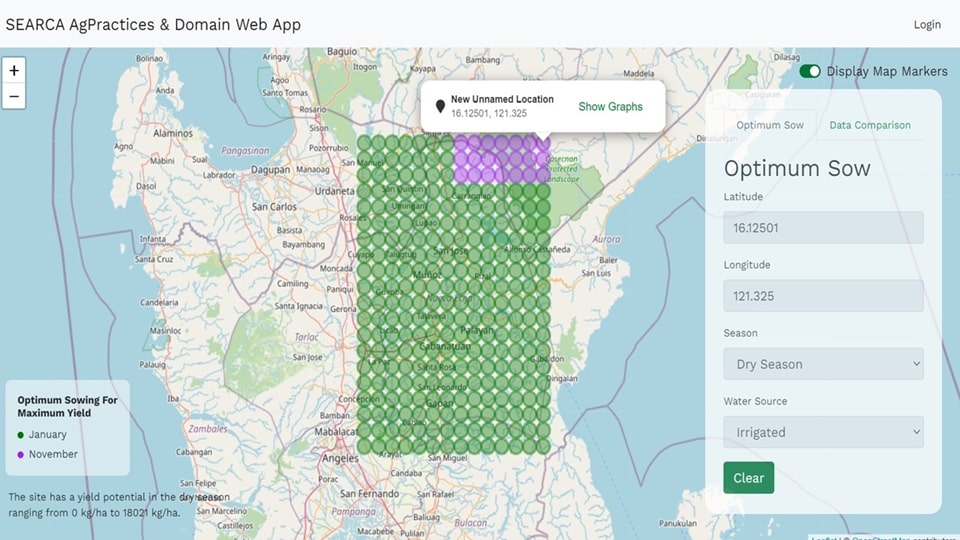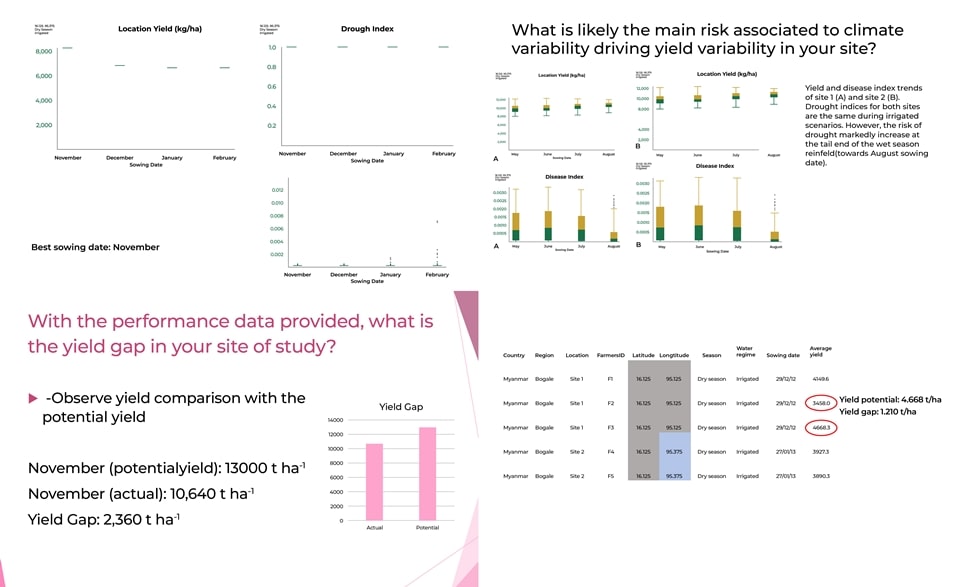The Southeast Asian Regional Center for Graduate Study and Research in Agriculture (SEARCA), in collaboration with the University of Southern Queensland (USQ) and the University of the Philippines Los Baños (UPLB), conducted a Workshop on Modeling Management of Climatic Stress in Rice-based Cropping Systems: The Application of the AgPractices&Domains Platform on 7-8 October 2021 via SEARCA's Online Learning and Virtual Engagements (SOLVE) Platform.
The two-day workshop was attended by 66 targeted and potential end-users of the tool from different Southeast Asian countries. The 66 attendees that have experience in agronomy, agriculture, and modeling systems, are members of the academe, research institutions, development organizations, and national and local government units, that are involved in policy planning and research extension. They came from Indonesia, Malaysia, Myanmar, the Philippines, Thailand, and Vietnam.
During the two-day virtual workshop, the attendees learned directly from the experts that conceptualized and developed the AgPractices&Domains platform, the features, and functionalities of the web-based application, and how it can conveniently help them in conducting their research studies, particularly in determining key factors of productivity under climatic stress. They were also given the chance to explore and experience firsthand the soon-to-be publicly released platform, which will be hosted by SEARCA under its Agriculture, Forestry, and Natural Resources (AFNR) Knowledge Platform to contribute to the achievement of the Center’s 11th Five-Year Plan.
“The AgPractices&Domains tool will provide an integrated pest and disease management options in rice-based cropping systems. The objective is to create a platform wherein a network of researchers can carry out rice cropping systems’ monitoring and evaluation, combined with documentation of community of practices,” said Dr. Glenn B. Gregorio, SEARCA Director. “The AgPractices&Domains tool will further facilitate learning and exchanges between institutions and countries,” he added. The tool is part of the AgPractices&Domains Platform, which includes the conduct of this workshop, which was funded by the Asi@Connect project, a European Union co-funded project.
 The AgPractices&Domains platform as displayed on the computer screen.
The AgPractices&Domains platform as displayed on the computer screen.
The AgPractices&Domains platform is a web-based application designed to bridge the gaps from the- laboratories to the fields and from research to practice and to harness precision tools for integrated pest and disease management options in rice-based cropping systems. “The AgPractices&Domains platform is a cloud-based collaborative research tool that allows data sharing and access and data product delivery. It is a one-stop shop for researchers in the evaluation of the impacts of practices and the changes in managing risks,” according to Dr. Val Randolf M. Madrid, Associate Professor at the Institute of Computer Science at UPLB. Dr. Madrid headed the team that developed the web-based platform.
“The AgPractices&Domains platform is a helpful tool in building the capacity of agricultural researchers in the targeted countries. It facilitates the access to outputs from crop model set within its domain of validation, improves the adoption of adaptative technologies to climate variability, and bridges practical research questions for cropping system management vis-à-vis the risk associated with climate variability including biotic and abiotic stresses and the site-specific adaptation options with spatially-explicit system evaluation,” shared Dr. Ando Mariot Radanielson, Senior Research Fellow at the Institute for Life Sciences and Environment of the University of Southern Queensland.
The other speakers invited were Dr. Adam Sparks, Senior Scientist and Bioeconomic Modeler for the Department of Primary Industries and Regional Development (DPIRD) State of Western Australia and an adjunct Associate Professor with the Centre for Crop Health at the USQ, and Ms. Hannah Jose, Agricultural and Biosystems Engineer at the UPLB Foundation, Inc. Dr. Sparks presented the Concept and Principles for Disease Modeling, while Ms. Jose presented Modeling Data Inputs and Outputs Case in Nueva Ecija, Philippines.
Practical exercises were then conducted wherein participants were grouped and given sets of sample data for particular sites to extract and compare information on location yield, disease index, drought index, and best sowing date.
 Excerpts from exercise outputs presented by groups.
Excerpts from exercise outputs presented by groups.
When asked to describe the potential contribution of the platform in terms of information availability, effectiveness, and delivery, many of the participants said that it provided reliable data, convenience, and expected impacts. Also, when they were asked about their experiences in using the platform, many of them said that it was easy to navigate, excellent, and interesting. Additionally, when they were asked about the advantages of having the AdPractices&Domains platform for their work, study, and research, many said that it can be used to explore scenarios and as a guide in forecasting, can be helpful for decision-making, help them identify sites for research, and can be useful for data gathering. These suggestions from potential users will help further shape the next steps for developing the AgPractices&Domains Platform.